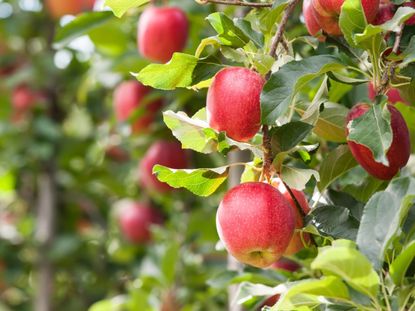Apple Tree Problems: How To Get Fruit On Apple Trees

Apple trees are a great addition to any landscape, and if healthy, will provide an abundance of fresh fruit. However, from time to time, apple tree problems do occur and require attention in order to keep trees as healthy as possible. Don't let your tree trick you. Even if it appears to be vibrant, you may occasionally wind up with an apple tree without fruit. Apple tree fruiting issues can be disconcerting to home gardeners, so learning how to get fruit on apple trees is helpful.
How to Get Fruit on Apple Trees
It goes without saying that most apple tree fruiting problems can be avoided by growing healthy trees. Obviously, a healthy apple tree will produce more fruit than a sick tree. Providing optimal conditions for your tree and sticking to a regular maintenance schedule will help your tree produce the most fruit possible. Address all insect or disease problems promptly, as fruit size and crop yield is dramatically influenced by both insect and disease damage. If you are unsure of how to diagnose or treat insect or disease issues, contact your local Cooperative Extension Department for assistance.
When Your Healthy Apple Tree Does Not Bear Fruit
An apple tree without fruit can happen for a number of reasons. Learning more about these apple tree problems can help if your apple tree does not bear fruit.
Environmental Issues
If your apple tree is healthy but does not set fruit, it could be due to climate issues. Fruit trees require a period of cold weather to end dormancy and encourage spring budding. If the winter is mild, growth will be slow and the blooming period extended. This makes the tree susceptible to frost damage, which influences fruit production.
Pollination Problems
In order for fruit to be produced, most trees must be pollinated. Cold weather and a reduction in pollinating insects can cause trees to blossom but bear no fruit. For best results with apple trees, plant two different varieties close together for cross pollination.
Other Considerations
Some fruit trees, including apple, may bear very heavily one year and only minimally the next. This condition is known as biennial bearing and is thought to be due to the influence that a very heavy crop has on crop production the following year. An apple tree without fruit may not be getting enough sun or water. Poor fruit production can also be caused by over fertilizing. Provide a 2 to 3 inch (5-8 cm.) layer of mulch around the tree, but not touching the trunk, for protection and moisture retention.
Gardening tips, videos, info and more delivered right to your inbox!
Sign up for the Gardening Know How newsletter today and receive a free download of our most popular eBook "How to Grow Delicious Tomatoes."
-
 Grow a Bathroom Oasis: 8 Best Bathroom Plants With No Light or Low Light
Grow a Bathroom Oasis: 8 Best Bathroom Plants With No Light or Low LightSome apartment dwellers grow the best bathroom plants with no light or low light. Read how one of our favorite plant lovers does it in the big city.
By Teo Spengler
-
 "My Worst Mistake" – Gardeners Share 10 Hard-Learned Lessons
"My Worst Mistake" – Gardeners Share 10 Hard-Learned LessonsGardeners never stop learning, and sometimes our mistakes are the best teachers. But why not save time and heartache by learning from other gardeners' failures?
By Melanie Griffiths